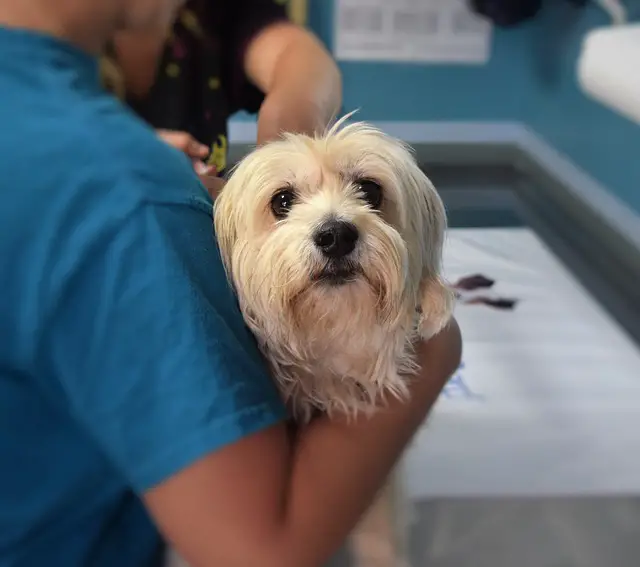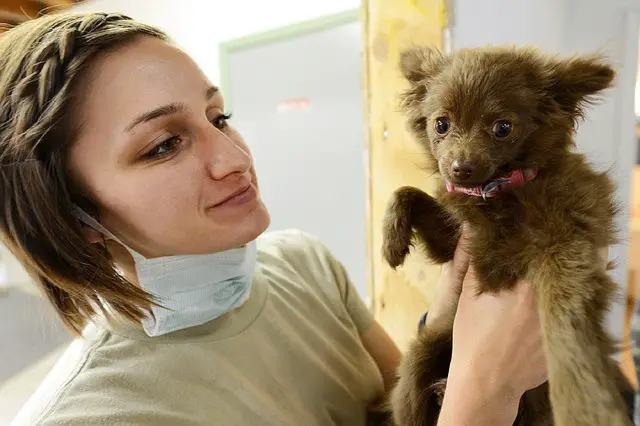Your dog has just completed his heartworm treatment, and now you want to know how long after a heartworm treatment your dog can be active.
Treating heartworm in dogs can be a long, strenuous process for you and your dog. There are fewer instances of dog healthcare where the saying “prevention is better than cure” is more apt than in the treatment of heartworm.
Treating heartworm is infinitely more difficult than preventing it.
In fact, the period of treatment and recovery is not just long and strenuous, it’s also life-threatening. If you don’t play your cards right in the weeks to months of recovery post-treatment, you could lose your dog. No jokes.
Table of Contents
An Overview of Heartworm Treatment In Dogs
Here’s something to chew on before we go into the overview of heartworm treatment. It covers everything you need to know from how infestation occurs to diagnosis, to treatment, and to recovery.
It begins with an evaluation of your dog’s overall health to ascertain just how serious the heartworm infestation is. Your vet has to know just how healthy your dog is before beginning treatment as this will determine the exact treatment they will prescribe.
Now, depending on what your vet recommends, your dog might require hospitalization for between 48 to 96 hours.
In the first phase of the treatment, your vet will kill the adult worms by giving your dog a series of injections. This will cause the worms to die off and dissolve gradually. As this is a gradual process, this stage would occur over a number of weeks.
After this stage, you’ll be taking your dog for routine checkups and testings to confirm that all the heartworms have been gotten rid of.
Finally, your vet will place your dog on heartworm preventative medicine which he will take for the rest of his life.
How Long After Heartworm Treatment Can A Dog Be Active?
Altogether, it can be a bit challenging as you’re expected to keep your dog completely inactive for, at least, 6 – 8 weeks. The first 30 days, however, are the most critical in post-heartworm-treatment. Keeping your dog at rest is highly critical as sudden, excessive activity and/or exercise can cause the dead worms to travel around the body. If this happens, the dead worms could go and clog some arteries which would cause serious complications in the heart and lungs. Only after the first month of inactivity are you permitted to try exercising again to build some strength. Of course, you can’t make that call alone. You must discuss this with your vet first.
What Should You Expect From Your Dog During Recovery After Heartworm Treatment?
Here’s what to expect from your dog during the recovery phase of heartworm treatment:
- Lethargy.
- Soreness in the muscles.
- A sharp increase in energy levels a few days after treatment.
1. Lethargy
A drop in energy levels and increased sleepiness are some symptoms you could expect in your dog after heartworm treatment. This is actually great as it means that your dog will more easily remain quiet for the period of his convalescence.
[amalinkspro type=”showcase” asin=”B07Y2GQF75″ apilink=”https://www.amazon.com/dp/B07Y2GQF75?tag=dpg-amalinks03-20&linkCode=osi&th=1&psc=1″ new-window=”true” addtocart=”true” nofollow=”true” sc-id=”4″ imgs=”LargeImage” link-imgs=”false” specs=”HIGH QUALITY COMFORT: The therapeutic gel memory foam comforts your dog by relieving body aches, joint pain, hip dysplasia, and arthritis, and giving optimal therapeutic support. It also works great as a cat bed, or a bed for all pets!~~~WATERPROOF & MACHINE WASHABLE: Easily combat accidents and keep your dog’s bed looking and smelling fresh and clean. No more messes! The zippered cover slides off seamlessly for convenient cleaning! Just throw it in the wash and it’ll be good as new.~~~MULTIPLE SIZES: Pick the perfect size for your pup! Available in Small (24 x 16 x 9), Medium (29 x 18” x 9”), and Large (22 x 35” x 10”). Arrives as a vacuum packed bed in a box, easily unzip and let it inflate for up to 72 hours!~~~NEUTRAL GREY COLOR: Our BarkBox bolster dog bed comes in a light grey! The perfect neutral, cozy color to match your home decor and conceal your dog’s fur. This high quality dog bed comes with a bonus surprise toy that your dog will love!~~~PERFECT DOG BED FOR MEDIUM DOGS: Can’t find a comfortable, high quality bed for your dog? This BarkBox dog bed comfortably fits dog breeds like Australian Cattle Dogs, Aussies, Bulldogs & Cocker Spaniels. Get the bed your dog deserves!~~~” btn-color=”#ff9900″ btn-text=”View on Amazon” alignment=”aligncenter” hide-prime=”0″ hide-image=”0″ hide-reviews=”0″ hide-price=”1″ hide-button=”0″ width=”750″]BarkBox Memory Foam Dog Bed | Plush Orthopedic Joint Relief 2-1 Crate or Pillow Bed, Machine Washable + Removable Cover; Waterproof Lining, Includes Squeaker Toy | Medium | Grey[/amalinkspro]
2. Soreness In The Muscles
The injections administered for heartworm treatment could cause soreness at the site where they are administered. Because of this, you want to be careful around that spot. Try not to touch or put pressure around that area else your dog would be in pain.
3. Energy Levels Increase After A Few Days
After a few days of lethargy and soreness would come the days when your dog begins to feel a little better. These are the days to be wary of. You need to be on the alert to make sure that your dog is resting and refraining from any exerting activity.
So, no walks and no play either. If he must go outside, do not let him run free, put him on a leash and bring him back in yourself.
If it’s getting difficult for you to “keep him on a leash,” then consider confining him to a large crate or a small portion of your home.
How Do I Keep My Dog Inactive For 6 – 8 Weeks After Heartworm Treatment?!

Understandably, that’s going to be a herculean task. Keeping your dog for a few hours is tough, not to mention six to eight weeks straight. If the dog is a younger dog or a rambunctious one, it could, of course, get a lot more challenging. Anyway, here are some ideas you could try.
- Train your dog to relax on request.
Preferably, begin this training before he goes in for treatment. You want your dog to have a positive association with lying in his crate or in his bed. If he has this mental connection, it’s easier to get him to be quiet.
- Train your dog to mentally engage himself much more.
Mental exercise can be just as exhausting as physical exercise. Yeah, we know, right? You can work with a clicker and engage your dog in short sessions several times a day. In these sessions, teach your dog new tricks that are not too physically exerting.
- You can have some white noise, calm music, or nature sounds playing around the house to keep your dog in a relaxed mood.
- Keep your dog furnished with dog puzzles, food-stuffed toys, and any other item that could keep his attention occupied.
Chew toys are also a great addition to the crate this period as they provide your dog with a low-stress activity he can engage in.
- Spend more time around your dog’s bed or crate so he doesn’t feel the need to keep getting up and moving around.
You can put his crate or bed beside you while you read, work on your laptop, or watch TV.
[amalinkspro type=”showcase” asin=”B01M8O0T4K” apilink=”https://www.amazon.com/dp/B01M8O0T4K?tag=dpg-amalinks03-20&linkCode=osi&th=1&psc=1″ new-window=”true” addtocart=”true” nofollow=”true” sc-id=”4″ imgs=”LargeImage” link-imgs=”false” specs=”USA ELK ANTLERS FOR DOGS MEDIUM is sized for Dogs 20-40lbs, such as a Beagle, Bulldog, and Dachshund. The length of the Medium Gnawtler elk antlers is 4.5 – 5. The medium dog bone is a good choice for dog toys for aggressive chewers & natural dog bones for the medium guys that need something to gnaw on besides your furniture, shoes or house. Medium Gnawtlers are great for large size dogs when they are teething puppies!~~~ALL NATURAL, HEALTHY & CLEAN TREAT – Our premium elk antlers dogs are packed with calcium, phosphorus, manganese & zinc making them perfect bone marrow dog treats. Unlike other processed & dyed options, Gnawtlers elk antler chews have no odor, no mess, & even after hours & hours of gnawing wont leave residue or coloring behind making them great for indoors & outdoors! Gnawtlers are also great for dental hygiene as the gnawing removes the build up of plaque found often with small & medium dogs.~~~CALLED GNAWTLERS FOR A REASON – To begin with, our elk antlers are specially selected from Grade A premium raw elk antler for their weight, density, color, & shape. From there, they are meticulously sorted, weighed, cut, sanded, inspected, vacuum sealed, & labeled becoming Gnawtlers. Our pieces are scrutinized from their original raw form laying on the forest & mountain ground all the way to your home & your pup to ensure your Gnawtler is up to Gnawtler standards.~~~A PERFECT DOGGY GIFT – Whether its your pups birthday, adoption anniversary, Christmas gift or just because theyre your furbaby and you love them, a Pet Parents Gnawtler elk antler dog bone makes a perfect gift for your gnawing dog! If you find your dog or puppy chewing on things around the house, tame the beast by giving them a Gnawtler and watch them chill out. In the super rare case your dog isnt going to town on the elk antler, boil it with a chicken or beef broth and watch them go nuts~~~VACUUM SEALED FOR YOUR DOGS SAFETY – Unlike other elk antlers on the market that are unprotected and may contact contaminants while waiting to be shipped or even during transit, all Gnawtlers are vacuum sealed for your dogs safety. Gnawtlers are natural antlers, shape, weight, density and color will vary, but we assure only the best become Gnawtlers! Dont settle for anything but the Gnawtler Standard, CLICK ADD TO CART and get your Pet Parents Gnawtlers today!~~~” btn-color=”#ff9900″ btn-text=”View on Amazon” alignment=”aligncenter” hide-prime=”0″ hide-image=”0″ hide-reviews=”0″ hide-price=”1″ hide-button=”0″ width=”750″]Gnawtlers – Premium Elk Antlers For Dogs, Naturally Shed Elk Antlers, USA Natural Elk Antler Chews, Specially Selected Elks Antlers From The Rocky Mountain & Heartland Regions – 4.5″- 5″ Elk Antler[/amalinkspro]
How Should I Care For My Dog At Home After Heartworm Treatment?
Here’s how to care for your dog at home when he gets back from the hospital:
- Give him his medication as recommended by your vet.
- Make sure he gets lots of rest and remains still.
- Keep his environment dry and stable.
- Ensure he always has access to fresh water.
- Observe him for side effects.
- Go back to the hospital after two weeks.
1. Medication
You will need the following medication for your dog post-heartworm treatment.
- Antibiotics: Secondary infection is a possibility during recovery after heartworm treatment in dogs. Hence the need for antibiotics.
- Some supplements for the liver: The liver would need some help dealing with all the drugs as well as the dead worms.
- Blood thinners to help the circulation of blood around the body.
- Your vet will recommend other necessary medicines as needed.
2. Rest
We must emphasize this again. Please and please enforce rest for your dog’s sake and yours. For the next 6 to 8 weeks, your dog must be at rest. No excitable moments at all and keep him on a leash if he must go out.

3. Keep His Environment Stable
Your dog’s immediate environment must be dry and stable. Even if your dog will most likely be crated for the better part of the recovery period, you want to keep him indoors, especially if it’s really hot outside.
Also, ensure that your dog always has access to fresh water at all times.
4. Observation
You must keep a close eye on your dog so you’d be able to notify your vet immediately you suspect something is wrong. Time is of the essence. Here are some warning signs to look out for:
- Frequent coughs.
- Loss of appetite.
- Lameness.
- Bloody urine or stool.
- Difficulty in breathing.
- Bleeding from the nose.
- Fever.
- Any other unusual behavioral changes.
Usually, these symptoms, if they are going to come, manifest within the first one week to ten days after the treatment. However, there are cases where symptoms were delayed for up to 4 weeks after complete treatment.
5. Go Back To The Hospital

Two weeks after the injection has been administered, you’d have to return to your vet for a blood test. This will confirm if all the heartworms have been effectively killed. If they have, they’ll start your dog on heartworm preventative medicine to avoid reinfection.
Check out these other helpful articles
- My dog ate chicken bones, what do I do?
- Dog leaking urine when lying down — what to do?
- How do I know if my dog has mange?
- How to get a dog to eat
- What kind of dog is Everest from Paw Patrol?
- How long after flea treatment can I bathe my dog?
After Complete Recovery
Hurray! So, you have patiently overcome 6 to 8 weeks of torture and now your doctor has given your dog a clean bill of health. Before you kick your feet up, sit up for a bit. You are not done by a long shot. The question about heartworm treatment does not end in how long it would take for your dog to be active.
In 6 months’ time, you’d have to go back to your vet again to confirm that all the worms are truly gone. Before then, your vet would have placed him on heartworm preventative medicine which he, sadly, will be on for life.
If his insides are spanking clean, then he will just have to continue with the preventative medicine and check in with the vet once every year for heartworm testing. Yes, for life.
If all’s not clear, then you’d have to treat those as well.
Don’t get discouraged if your dog doesn’t get the all-clear right away. For many dogs, it takes several months before all the worms are declared entirely absent.
The good news, though, is that the success rate of heartworm treatment is really high as 98% of them turn out successful.
Before you go, why not learn how to prevent heartworm disease in dogs for your other non-diseased pets. In this video, Dr. Jeff Werber discusses how heartworm develops and spreads, as well as how you can prevent it.
How Long After Heartworm Treatment Can Dog Be Active? — Related FAQs
Can I Walk My Dog After Heartworm Treatment?
After a heartworm treatment, while your dog is recovering, you need to keep your dog as still as possible. This means no running, no rough-housing, and no definitely no walks. Of course, you would have to walk your dog to pee and poop or to sit with you outdoors.
However, please, limit physical activity to the barest minimum because the more your dog engages in physical activity, the higher the chances of complications arising from adult worms blocking major blood vessels. This could lead to shock and, ultimately, death.
Does Heartworm Treatment Shorten Your Dog’s Life?
The heartworm treatment in itself does not shorten your dog’s life. Dogs that have died from heartworm treatment are usually those who were made to exercise too early after treatment. This is why it is important to ensure that your dog does not move around too early.
How Do You Keep An Active Dog Calm While Recovering From Heartworm Treatment
You can engage your dog in mental activities rather than physical activities. Clickers, for example, are great fun and there are many tricks you can teach your dog to carry out that would be as exhausting as physical activity but without all the movement. Chew toys and food-stuffed Kong toys also provide low-stress activity for dogs to engage in while recovering from heartworm treatment.
Also, you want to spend as much time with your pet as possible. Your dog still needs social interaction even though he is not allowed to move around much just yet.
Can A Dog Fully Recover From Heartworms?
Most dogs get successfully treated from heartworms. The most important things to keep in mind when treating heartworm in your dog are to stabilize your dog after the diagnosis has been made, kill all adult heartworms, and avoid the side effects as much as possible.
Is Heartworm Treatment Painful For The Dog?
Heartworm treatment could be a little painful for some dogs especially around the lower back. It could also cause the dog to feel nauseated as well.
When treating your dog for heartworms, your vet would administer a series of injections known as an immiticide or an adulticide in the lumbar region of your dog’s body using a long needle. These injections are arsenic-based but newer injections contain less arsenic. Thankfully, usually, both symptoms ease up after a couple of days.
What Is The Success Rate of Heartworm Treatment in Dogs?
There is a new drug available for heartworm treatment for dogs that has a 95% success rate in dogs. Older drugs contain arsenic and usually have several toxic side effects when used, although fatalities are still quite rare. This new drug, on the other hand, does not come with as many side effects as the old one which is why it is so successful.